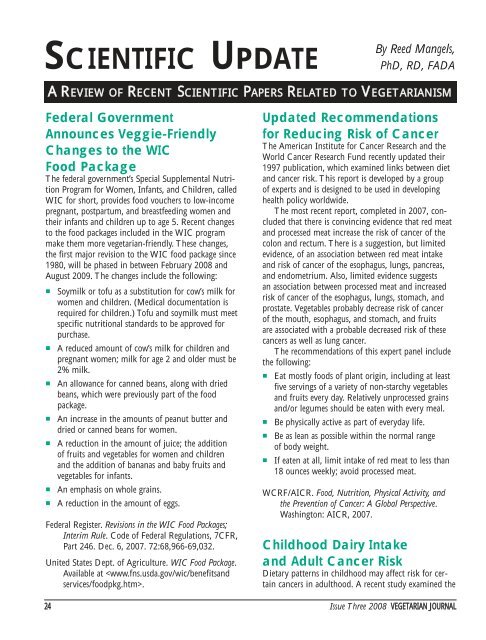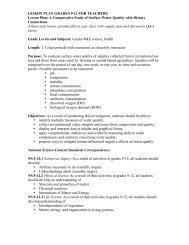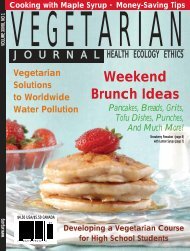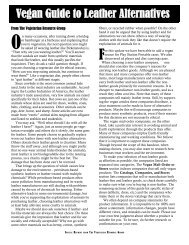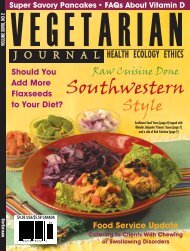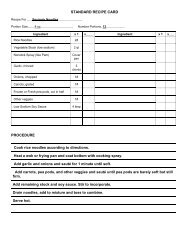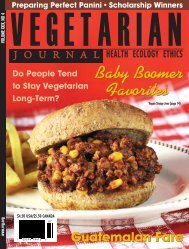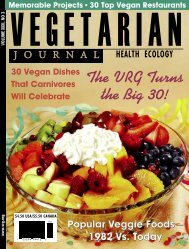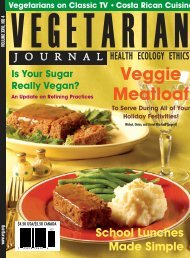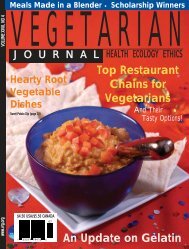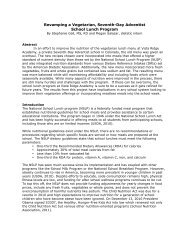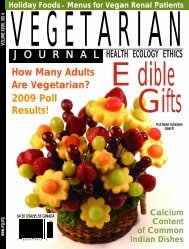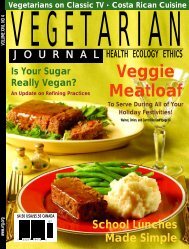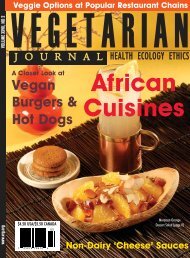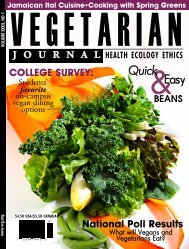SCIENTIFIC UPDATEBy Reed Mangels,PhD, RD, FADAA REVIEW OF RECENT SCIENTIFIC PAPERS RELATED TO VEGETARIANISMFederal GovernmentAnnounces Veggie-FriendlyChanges to the WICFood Package<strong>The</strong> federal government’s Special Supplemental NutritionProgram for Women, Infants, and Children, calledWIC for short, provides food vouchers to low-incomepregnant, postpartum, and breastfeeding women andtheir infants and children up to age 5. Recent changesto the food packages included in the WIC programmake them more vegetarian-friendly. <strong>The</strong>se changes,the first major revision to the WIC food package since1980, will be phased in between February 2008 andAugust 2009. <strong>The</strong> changes include the following:• Soymilk or tofu as a substitution for cow’s milk forwomen and children. (Medical documentation isrequired for children.) Tofu and soymilk must meetspecific nutritional standards to be approved forpurchase.• A reduced amount of cow’s milk for children andpregnant women; milk for age 2 and older must be2% milk.• An allowance for canned beans, along with driedbeans, which were previously part of the foodpackage.• An increase in the amounts of peanut butter anddried or canned beans for women.• A reduction in the amount of juice; the additionof fruits and vegetables for women and childrenand the addition of bananas and baby fruits andvegetables for infants.• An emphasis on whole grains.• A reduction in the amount of eggs.Federal Register. Revisions in the WIC Food Packages;Interim Rule. Code of Federal Regulations, 7CFR,Part 246. Dec. 6, 2007. 72:68,966-69,032.United States Dept. of Agriculture. WIC Food Package.Available at .Updated Recommendationsfor Reducing Risk of Cancer<strong>The</strong> American Institute for Cancer Research and theWorld Cancer Research Fund recently updated their1997 publication, which examined links between dietand cancer risk. This report is developed by a groupof experts and is designed to be used in developinghealth policy worldwide.<strong>The</strong> most recent report, completed in 2007, concludedthat there is convincing evidence that red meatand processed meat increase the risk of cancer of thecolon and rectum. <strong>The</strong>re is a suggestion, but limitedevidence, of an association between red meat intakeand risk of cancer of the esophagus, lungs, pancreas,and endometrium. Also, limited evidence suggestsan association between processed meat and increasedrisk of cancer of the esophagus, lungs, stomach, andprostate. Vegetables probably decrease risk of cancerof the mouth, esophagus, and stomach, and fruitsare associated with a probable decreased risk of thesecancers as well as lung cancer.<strong>The</strong> recommendations of this expert panel includethe following:• Eat mostly foods of plant origin, including at leastfive servings of a variety of non-starchy vegetablesand fruits every day. Relatively unprocessed grainsand/or legumes should be eaten with every meal.• Be physically active as part of everyday life.• Be as lean as possible within the normal rangeof body weight.• If eaten at all, limit intake of red meat to less than18 ounces weekly; avoid processed meat.WCRF/AICR. Food, Nutrition, Physical Activity, andthe Prevention of Cancer: A Global Perspective.Washington: AICR, 2007.Childhood Dairy Intakeand Adult Cancer RiskDietary patterns in childhood may affect risk for certaincancers in adulthood. A recent study examined the24 Issue Three 2008 VEGETARIAN JOURNAL
link between childhood dairy intake and adult cancers.<strong>The</strong> initial information for this study was collectedclose to 70 years ago in Great Britain. Approximately5,000 children were studied, and their dairy intake wasestimated based on the amount of dairy products usedby their household. <strong>The</strong> children were tracked throughadulthood, and the investigators identified those whohad developed cancer. High childhood dairy intake(including milk, cheese, and ice cream) was associatedwith an increased risk of colorectal cancer but not withan increased risk of breast, prostate, or stomach cancer.Higher milk intake (a little more than a cup of milkdaily) in childhood was also associated with an increasedrisk of colorectal cancer and a decreased risk of prostatecancer in adulthood. <strong>The</strong> study’s researchers speculatethat dairy intake in childhood may affect the functioningof the immune system and thereby increase cancerrisk, although this is only one possibility.Van der Pols JC, Bain C, Gunnell D, et al. 2007.Childhood dairy intake and adult cancer risk:65-y follow-up of the Boyd Orr cohort. Am JClin Nutr 86:1,722-29.Obesity May ReduceHealth Care CostsObesity may reduce health care costs? That statementseems counterintuitive. After all, doesn’t obesity leadto medical problems that increase health care costs?A recent report from the Netherlands suggests otherwise.This study, conducted with computer modeling,predicted that preventing obesity can help people tolive longer. People who live longer have higher healthcare costs, especially in the later years. Obese peoplehave higher medical costs than do non-obese people,if you compare them from one year to the next.However, obesity increases risk for diseases like diabetesand heart disease, which frequently results ina shorter lifespan. This shorter lifespan in those withobesity tends to lower lifelong medical costs.<strong>The</strong> question of the impact of longer life on healthcare costs has not been directly studied with vegetarians.Some studies of vegetarian Seventh-day Adventists suggestthat they take less medicine and have fewer hospitalstays than do non-vegetarians, possibly resulting ina reduced health care cost compared to non-vegetarians.Should these results be used to slash funding forobesity prevention programs? Of course not! Obesityprevention does not have to reduce health care costs tobe important. Obesity can cause suffering and death,so any interventions that can help people live longer,healthier lives should be pursued, regardless of thehypothetical potential for increased health care costsdue to the resultant longer lifespan.van Baal PHM, Polder JJ, deWit GA, et al. 2008.Lifetime medical costs of obesity: Prevention nocure for increasing health expenditure. PLoS Med5(2): e29. doi:10.1371/journal. pmed.0050029.Nuts — More May Be LessIf you eat several handfuls of nuts every day in additionto your usual food intake and don’t increase your activity,you’ll gain weight, right? That’s what we’d expect tohear since those several handfuls of nuts would supplyseveral hundred calories more than you usually takein, and extra calories lead to weight gain. Imagine howsurprised researchers must have been when they lookedat studies where subjects were fed nuts in addition totheir usual food and either did not gain weight or didnot gain as much weight as would be expected basedon the extra calories. This has been seen in studies usingalmonds, peanuts, pecans, walnuts, and macadamianuts. How could this be?Researchers in Ghana, Brazil, and the United Stateshypothesized that the nuts were not being completelyabsorbed—that some of the nuts’ calories were nevergetting into the subjects’ bodies. To test this, they gavehealthy men and women approximately 2 ounces ofpeanuts, peanut butter, peanut oil, or peanut flour.<strong>The</strong>n, they measured how much fat appeared in thesubjects’ stools. Any fat that showed up in their stoolswas fat that had not been absorbed and representedcalories that were unavailable. <strong>The</strong> group that atepeanuts had significantly more fat in their stools andlost more calories through this route. Approximately athird of the fat the peanuts should have supplied to thebody actually was excreted in the stool. This loss maybe due to an inability to absorb all of the fat in peanuts,possibly because the nuts were not completely digested.While the results of this study should not be takento mean that nuts can be eaten without regard to theircalories, they do suggest that limited amounts of nutscan be used as a part of a healthy diet without necessarilyresulting in weight gain.Traoret CJ, Lokko P, Cruz ACRF, et al. 2008. Peanutdigestion and energy balance. Int J Obes 32:322-28.Thanks to Jay Lavine, MD, for pointing out this article.VEGETARIAN JOURNAL Issue Three 2008 25


